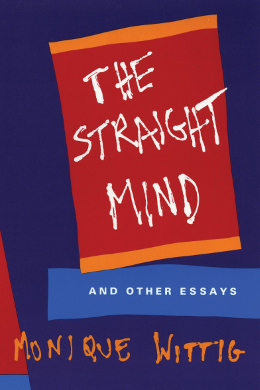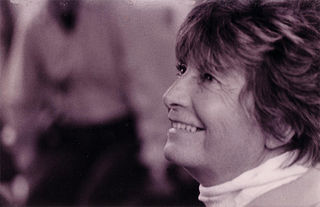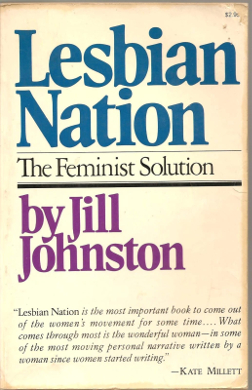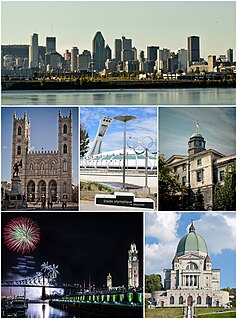Radical feminism is a perspective within feminism that calls for a radical reordering of society in which male supremacy is eliminated in all social and economic contexts.

Lesbian feminism is a cultural movement and critical perspective, most influential in the 1970s and early 1980s, that encourages women to direct their energies toward other women rather than men, and often advocates lesbianism as the logical result of feminism.
Feminist separatism is the theory that feminist opposition to patriarchy can be achieved through women's separation from men. Because much of the theorizing is based in lesbian feminism, feminist separatism is often thought of as simply lesbian separatism, but many aspects of the feminist movement utilize and have been influenced by feminist separatism.

The Straight Mind and Other Essays is a (1992) collection of essays by Monique Wittig.
Political lesbianism is a phenomenon within feminism, primarily second-wave feminism and radical feminism; it includes, but is not limited to, lesbian separatism. Political lesbianism embraces the theory that sexual orientation is a political and feminist choice, and advocates lesbianism as a positive alternative to heterosexuality for women as part of the struggle against sexism.

Cell 16 was a militant feminist organization in the United States known for its program of celibacy, separation from men and self-defense training. Considered too extreme by many mainstream feminists, the organization acted as a sort of hard left vanguard.
Amazones d'Hier, Lesbiennes d'Aujourd'hui is the name of a quarterly French language magazine published starting 1982 by a lesbian collective in Montreal, Quebec made of Louise Turcotte, Danielle Charest, Genette Bergeron and Ariane Brunet.

Michèle Causse was a French lesbian theorist, translator and author.
The Gouines Rouges are a French radical feminist lesbian movement.
A variety of movements of feminist ideology have developed over the years. They vary in goals, strategies, and affiliations. They often overlap, and some feminists identify themselves with several branches of feminist thought.
Feminist views on sexuality widely vary. Many feminists, particularly radical feminists, are highly critical of what they see as sexual objectification and sexual exploitation in the media and society. Radical feminists are often opposed to the sex industry, including opposition to prostitution and pornography. Other feminists define themselves as sex-positive feminists and believe that a wide variety of expressions of female sexuality can be empowering to women when they are freely chosen. Some feminists support efforts to reform the sex industry to become less sexist, such as the feminist pornography movement.
Feminist views on sexual orientation widely vary. Feminist views on sexual orientation are often influenced by the personal experiences of feminists, as expressed in the feminist slogan "the personal is political." Because of this, many feminists view sexual orientation as a political issue and not merely a matter of individual sexual choice or preference. There are issues of inclusion for feminists who identify as asexual, bisexual or heterosexual within a movement which at times has centred around lesbian feminism. Conversely, issues of lesbophobia and biphoia have also arisen. There is also debate about the relationship with gay and bisexual men, and the influence of their culture on feminist lesbians in particular.

Lesbian Nation: The Feminist Solution is a 1973 book by the radical lesbian feminist author and cultural critic Jill Johnston. The book was originally published as a series of essays featured in The Village Voice from 1969 to 1972.
The following is a timeline of the history of feminism. It should contain events within the ideologies and philosophies of feminism. It should not contain material about changes in women's legal rights. See also: Timeline of women's legal rights , Timeline of women's suffrage and Women's suffrage.
Míriam Martinho is one of the leading feminists in Brazil and part of the second generation of feminist journalists, who emerged in the 1980s. She was one of the first people to bring lesbianism openly into the fold of feminism and founded one of the first Lesbian-Feminist organizations in the country. She and Rosely Roth gained recognition for staging a protest, known at the "Brazilian Stonewall" at Ferro's Bar in 1983. She has written for numerous LGBT and feminist journals and has submitted expert testimony on the state of the LGBT community in Brazil.
The Leeds Revolutionary Feminist Group was a feminist organisation active in the United Kingdom in the 1970s and 1980s. While there were a number of contemporary revolutionary feminist organisations in the UK, the Leeds group was 'internationally significant'. The group is remembered chiefly for two reasons. The first is organising the UK-wide ‘Reclaim the Night’ marches in November 1977. The second is the publication of the pamphlet Political Lesbianism: The Case Against Heterosexuality, which advocated political lesbianism. Australian activist Sheila Jeffreys was closely involved with the group, while UK feminist Julie Bindel has spoken of the group’s influence on her, as have many others.
Womyn's land is an intentional community organized by lesbian separatists to establish counter-cultural, women-centered space, without the presence of men. These lands were the result of a social movement of the same name that developed in the 1970s in the United States, Australia, New Zealand, and western Europe. Many still exist today. Womyn's land-based communities and residents are loosely networked through social media; print publications such as newsletters; Maize: A Lesbian Country Magazine; Lesbian Natural Resources, a not-for-profit organization that offers grants and resources; and regional and local gatherings.










